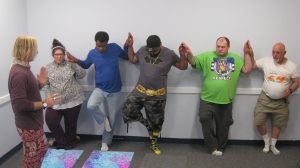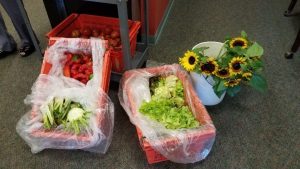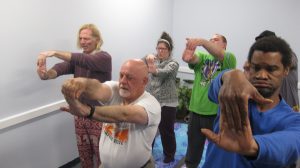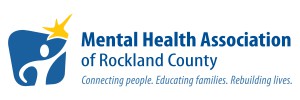November 2018 PROVIDER SPOTLIGHT is:
NYAPRS is recognizing ASFL for their recent: CARF Accreditation, highlighting the creation of their PROS Participant Handbook and Checklist Initiative, and Partnering for Health Program.
Access: Supports for Living recently received a three year accreditation from the Commission on Accreditation of Rehabilitation Facilities (CARF), which includes our 5 PROS programs. As an organization we decided to work towards this accreditation to enhance services for individuals we support, provide continuous quality, increase consumer involvement, and strengthen the consistency amongst and between programs. There have been many positive outcomes that have emerged from this process including increased and diversified staff trainings, review of all of our protocols and workflows, an enhanced supervision process, and an increase in consumer involvement in the development of program processes and services.
Going through this accreditation process provided us with many positive outcomes, however one of our most significant improvements came from the development of our enriched engagement practices, which includes a new PROS Participant Handbook and Checklist. During the process of reviewing criteria for accreditation it became apparent to us that we were not always consistent in the information that we were providing to individuals who were coming into PROS for the first time. We had always relied on verbally communicating information to individuals about PROS services, program structure and other pertinent recovery information at the first visit. However, in going through this process we discovered that information provided at the first visit greatly varied from program to program and even between staff within a program. In order to become more consistent in our practices we developed a new handbook and checklist to help support staff in providing comprehensive information to individuals on their first day at PROS.
Prior to starting this process, we asked our current consumers what their experiences were like when they first started PROS. Many of them shared that while everyone was very friendly and supportive, the process felt overwhelming and at times anxiety provoking. Several individuals shared that not knowing anyone or what to expect on his or her first day was stressful. They also felt that they may have missed information because they were nervous and/or experiencing information overload. After gathering consumer feedback, we began the process of creating the new PROS Participant Handbook and Checklist. We decided that we should continue sharing information verbally but also wanted to develop something that individuals could take home. With this in mind we created our new handbook. We currently use this handbook as a guide and review it with a new consumer on their first day, we complete the checklist to make sure we don’t miss anything and provide a copy of the handbook to the individual as a reference. While we are in the process of adding new information and resources, the current version of the PROS Participant Handbook includes contact information, community support information, how to read PROS schedule, information about Peer Advisory Committee and much more. Since making this change we have received a lot of positive feedback from staff and consumers about our new engagement process. Enhancing the first visit has allowed us to strengthen our engagement with new consumers and increase the likelihood of them returning to the program for services.
Links for the Handbook is HERE and for the Checklist is HERE
Partnering for Health
In addition, Access: Supports for Living’s Poughkeepsie PROS program has partnered with the Poughkeepsie Farm Project to deliver fresh fruit and vegetables once a week to the PROS program.
Not everyone has access to healthy food choices. Fresh fruits and vegetables can be expensive and are not always readily available to the individuals we serve in our PROS communities.
The Poughkeepsie Farm Project is a Community Support Agriculture (CSA) project which grows fresh vegetables and fruits, trains future famers, provides hands-on education programs and improves availability of healthy food for individuals who may not have the means to access it. One of their projects is a food share program in which they collect fruits and vegetables from local farms as well as from their own farm and distribute once a week to local agencies and nonprofits.
Stephanie Bifolco a therapist at Access: Supports for Living Poughkeepsie PROS coordinated with the Poughkeepsie Farm Project to have fresh fruit and vegetables delivered to the program every Monday. Viewing this as an opportunity, Toni Hamilton and Melodie Weldon, Team Leaders at Poughkeepsie PROS decided to integrate educational services and activities as a way to teach individuals about nutrition and making healthy choices.
Because many of the community members were unsure about how to prepare the vegetables delivered, the Poughkeepsie PROS team began printing out recipes and discussing ways to cook the vegetables in healthy ways. Providing education about portion control and using healthy ingredients were an essential part of these activities. The fresh fruits and vegetables were also used to increase mindful eating habits and the concept of slowing down to enjoy the food we eat. Developing an understanding of how the food we consume contributes to both our physical and mental health, including stress and energy levels was also an important part of this learning process.
The Farm Project delivery was so popular that Toni and Melodie decided to integrate other healthy activities. Thus, Chair Yoga was one of the activities added to the schedule after the distribution of fruit and vegetable delivery on Mondays. They felt that Chair yoga, a more gentle form of yoga, could provide an opportunity for the community to increase flexibility and strengthen physical and mental awareness. Combining these healthy activities has been well received by the PROS community and has become a favorite part of the week for many individuals who attend the program. Community members feel that they have learned a lot about nutrition, eating healthy and understanding how the food we consume effects our body and mind. In fact, one community member shared that she has achieved her weight goal and is now eligible for bariatric surgery, something that she has struggled with achieving in the past.
It is estimated that about 50-60 community members take home fresh fruit and vegetables every Monday from the Poughkeepsie Farm Project deliveries. There have been a wide variety of fresh fruit and vegetables delivered over the last few months including watermelon, cucumbers, cabbage, lettuce, squash, carrots, tomatoes and so much more. The Poughkeepsie PROS team feels that this has been a successful partnership with the Poughkeepsie Farm project, one that has provided an opportunity to strengthen healthy choices by allowing access to fresh fruit and vegetables, something that is not always readily available to individuals who attend PROS.
For all questions regarding ASFL please contact Toni Willis at twillis@asfl.org
Previous Spotlight:
Call it “PROGA” Maryhaven’s PROS West in Yaphank uses Yoga as a part of the Recovery Toolkit By Mark Rhodes
Stereotypically the purview of the counter culture, hippies and bohemians, Yoga has filtered into the mainstream to the point where it feels like everybody has a Yoga practice. In recent years there has been a surge of interest in applying yoga within the area of managing mental health disorders and symptoms such as anxiety, depression, PTSD, and eating disorders. There have been myriad studies indicating that a consistent yoga practice (roughly 2-3 times a week for 20-30 minutes) will alleviate mental health symptoms, often in a dramatic fashion. Yoga, with its unique emphasis on the connection of mind and body helps those struggling with mental health disorders the opportunity to see that their mind and body are something they can work with in a yoga practice rather than against in struggles with symptoms or health issues. Many mental health professionals believe that yoga can calm the nervous system and can function as a concrete method for coping and managing stress. Also, Yoga’s focus on setting an intent and being present helps foster the idea of positive thinking and emphasizing taking an active role in recovery. Beyond this, there are a legion of physical benefits as Yoga is beneficial in lowering blood pressure, promoting weight loss and
 PROS West in Yaphank has yoga as part of recovery programming. Mark Rhodes, a 200 hour RYT certified Yoga Instructor leads clients in a 45 minute practice which is a fusion of standing and kneeling poses, body work, breathing, mediation and some core work. Other aspects of Yoga are discussed and utilized within some of the other PROS West groups such as Stress Management, Recovery Through Movement and “Mindful Monday.” Alec D of PROS West is one of the participants and admits that the practice has a noticeable benefit for his recovery work. “Yoga helps me unwind and loosens up the tension in my body.” Another PROS client, Jerome D, believes “Yoga helps my peace of mind and keeps me relaxed in body and mind.”boosting the immune system.
PROS West in Yaphank has yoga as part of recovery programming. Mark Rhodes, a 200 hour RYT certified Yoga Instructor leads clients in a 45 minute practice which is a fusion of standing and kneeling poses, body work, breathing, mediation and some core work. Other aspects of Yoga are discussed and utilized within some of the other PROS West groups such as Stress Management, Recovery Through Movement and “Mindful Monday.” Alec D of PROS West is one of the participants and admits that the practice has a noticeable benefit for his recovery work. “Yoga helps me unwind and loosens up the tension in my body.” Another PROS client, Jerome D, believes “Yoga helps my peace of mind and keeps me relaxed in body and mind.”boosting the immune system.
Yoga also helps clients become more confident in their movement and allows for boosts in self esteem due to the opportunity to master the practice. With all of these benefits that touch on the physical, emotional and psychological there is little surprise that Yoga is quickly becoming a fixture in Mental Health Programming.
For questions, please contact Mark Rhodes at MarkS.Rhodes@chsli.org or the Maryhaven PROS Director, Amanda Dondero at amanda.dondero@chsli.org
to Maryhaven PROS West
Previous Spotlight
Jonathan Vargas, Pace University
FINDING MEANING: MY LIFE STORY
This curriculum is offered to all through the generosity of the Mental Health Association of Rockland County. It was created by Jonathan Vargas, a Social Work Intern from Pace University and has provided a 3-month and a 6-month version of the curriculum.
‘This curriculum is heavily rooted with narrative therapy practices for a process-oriented young adult to older adult group. It seeks to be a psychoeducational group with journaling integrated throughout to allow members to redefine their self-concept and promote a healthier shift in perspective about their life’s purpose and meaning. It begins by establishing trust within the group, followed by introducing principles of narrative identity and the skills associated with the practice. These include separating problems from oneself, finding exceptions, identifying dominant themes, then re-establishing one’s past and present stories to be more empowering.’ – Jonathan Vargas
MHA-Rockland Finding Meaning – My Life Story (Class Outline)
MHA-Rockland Finding Meaning – My Life Story (3 Month)
MHA-Rockland Finding Meaning – My Life Story (6 Month)
PREVIOUS PROVIDER SPOTLIGHTS CAN BE FOUND ON THIS WEBSITE.
What about  YOUR Services?
YOUR Services?
If you are interested in sharing with us the special work your agency is doing, contact us and provide information about your services and what specifically you are interested in us showcasing.
Send an email to:
Ruth Colón-Wagner, LMSW
Director of Training and Development






